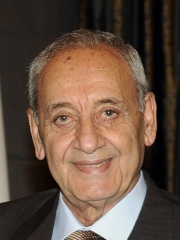
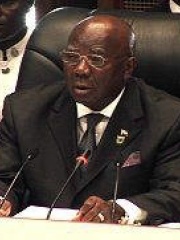
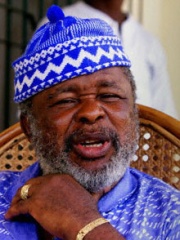
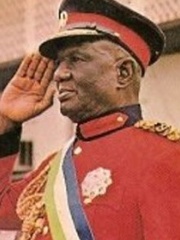
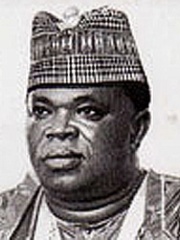
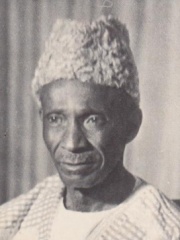
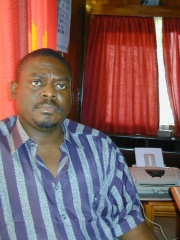
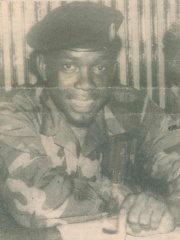
The Most Famous
POLITICIANS from Sierra Leone
This page contains a list of the greatest Sierra Leonean Politicians. The pantheon dataset contains 19,576 Politicians, 10 of which were born in Sierra Leone. This makes Sierra Leone the birth place of the 155th most number of Politicians behind Lesotho, and Monaco.
Top 10
The following people are considered by Pantheon to be the top 10 most legendary Sierra Leonean Politicians of all time. This list of famous Sierra Leonean Politicians is sorted by HPI (Historical Popularity Index), a metric that aggregates information on a biography's online popularity. Visit the rankings page to view the entire list of Sierra Leonean Politicians.

1. Nabih Berri (b. 1938)
With an HPI of 66.11, Nabih Berri is the most famous Sierra Leonean Politician. His biography has been translated into 21 different languages on wikipedia.
Nabih Mustafa Berri (Arabic: نبيه مصطفى برّي, romanized: Nabīh Muṣṭafā Barriyy ; born 28 January 1938) is a Lebanese politician who has been serving as Speaker of the Parliament of Lebanon since 1992. He heads the Amal Movement and its parliamentary wing, Development and Liberation Bloc.

2. Ahmad Tejan Kabbah (1932 - 2014)
With an HPI of 62.96, Ahmad Tejan Kabbah is the 2nd most famous Sierra Leonean Politician. His biography has been translated into 37 different languages.
Alhaji Ahmad Tejan Kabbah (16 February 1932 – 13 March 2014) was a Sierra Leonean politician who served twice as the 3rd President of Sierra Leone, from 1996 to 1997 and again from 1998 to 2007. An economist and attorney by profession, Kabbah spent many years working for the United Nations Development Programme. He retired from the United Nations and returned to Sierra Leone in 1992. In early 1996, Kabbah was elected leader of the Sierra Leone People's Party (SLPP) and was the party's presidential candidate in the country's first free presidential election later that year. He was elected with 59% of the vote, defeating his closest rival, John Karefa-Smart of the United National People's Party (UNPP), who had 40% in the runoff vote and conceded defeat. International observers declared the election free and fair. Kabbah campaigned on a promise to end the civil war if elected president. During his inauguration speech as president, Kabbah repeated the promise to end the civil war, which he indeed achieved later in his presidency. A deeply devoted Muslim, Kabbah was born in Pendembu, Kailahun District in Eastern Sierra Leone, though he was raised in the capital Freetown. Kabbah was an ethnic Mandingo. Kabbah was Sierra Leone's first and currently the only Muslim head of state of the country. Kabbah's first marriage, in 1965, was to Patricia Tucker, a devout Christian from the Sherbro ethnic group and a native of Bonthe District in Southern Sierra Leone. He and Patricia Kabbah had five children. The two were often seen together in public before his presidency. She was very influential during his presidency, focusing mainly on humanitarian issues, and was outspoken on the need to end the civil war. She died from an illness in 1998 and thus did not live to see the war's end in 2002. A year after he left office as president, and ten years after the death of his wife Patricia, Kabbah married Isata Jabbie Kabbah, an ethnic Mandingo and a Muslim in an Islamic wedding ceremony in Freetown. They remained married until he died in 2014. Most of Kabbah's time in office was influenced by the civil war with the Revolutionary United Front, led by Foday Sankoh, which led to him being temporarily ousted by the military Armed Forces Revolutionary Council from May 1997 to March 1998. He was soon returned to power after military intervention by the Economic Community of West African States (ECOWAS), led by Nigeria. Another phase of the civil war led to the United Nations and British involvement in the country in 2000. As President, Kabbah opened direct negotiations with the RUF rebels to end the civil war. He signed several peace accords with the rebel leader Foday Sankoh, including the 1999 Lomé Peace Accord, in which the rebels, for the first time, agreed to a temporary ceasefire with the Sierra Leone government. When the cease-fire agreement with the rebels collapsed, Kabbah campaigned for international assistance from the British, the United Nations Security Council, the African Union and the Economic Community of West African States to help defeat the rebels and restore peace and order in Sierra Leone. Kabbah declared the civil war officially over in early 2002. Tens of thousands of Sierra Leoneans across the country took to the streets to celebrate the end of the war. Kabbah went on to easily win his final five-year term in office in the presidential election later that year, defeating his main opponent Ernest Bai Koroma of the main opposition All People's Congress (APC) with 70.1% of the vote–the largest margin of victory for a free election in the country's history. International observers declared the election free and fair.

3. Foday Sankoh (1937 - 2003)
With an HPI of 61.65, Foday Sankoh is the 3rd most famous Sierra Leonean Politician. His biography has been translated into 21 different languages.
Foday Saybana Sankoh (17 October 1937 – 29 July 2003) was a Sierra Leonean rebel leader who was the founder and commander of the Revolutionary United Front (RUF) rebel group, which was supported by the Charles Taylor-led NPFL in the 11-year-long Sierra Leone Civil War, starting in 1991 and ending in 2002. An estimated 50,000 people were killed during the war, and over 500,000 people were displaced into neighboring countries.

4. Siaka Stevens (1905 - 1988)
With an HPI of 58.54, Siaka Stevens is the 4th most famous Sierra Leonean Politician. His biography has been translated into 31 different languages.
Siaka Probyn Stevens (24 August 1905 – 29 May 1988) was the leader of Sierra Leone from 1967 to 1985, serving as Prime Minister from 1967 to 1971 and as President from 1971 to 1985. Stevens' leadership was often characterized by patrimonial rule, violence, and self-indulgence, consolidating power by means of corruption and exploitation. Stevens and his All People's Congress (APC) party won the closely contested 1967 Sierra Leone general elections over incumbent Prime Minister Sir Albert Margai of the Sierra Leone People's Party (SLPP). In April 1971, Stevens made Sierra Leone a republic and became president a day after the constitution had been ratified by the Sierra Leone Parliament. Though generally considered as the first president of Sierra Leone, technically he was the second President of the Republic after Christopher Okoro Cole, a judge, who was sworn in for a day after which he resigned, paving the way for Stevens. Stevens served as Chairman of the Organisation of African Unity (OAU) from 1 July 1980 to 24 June 1981, and pioneered the creation of the Mano River Union, a three-country economic union comprising Sierra Leone, Liberia, and Guinea. Stevens retired from office at the end of his term on 28 November 1985. After pressuring all other potential successors to step aside, he chose Major-General Joseph Saidu Momoh, the commander of the Sierra Leone Armed Forces, as his successor. He died on 29 May 1988, in Freetown. He was seen as a "Pragmatic Socialist"
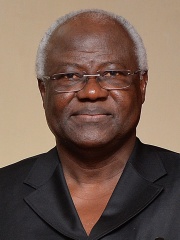
5. Ernest Bai Koroma (b. 1953)
With an HPI of 57.46, Ernest Bai Koroma is the 5th most famous Sierra Leonean Politician. His biography has been translated into 47 different languages.
Ernest Bai Koroma (born 2 October 1958) is a Sierra Leonean politician who served as the fourth President of Sierra Leone from 17 September 2007 to 4 April 2018. Born and raised in Makeni in northern Sierra Leone, Koroma spent more than 24 years working in the private insurance industry before entering politics in 2002. From 1988 to 2002, he was the managing director of the Reliance Insurance Trust Corporation (Ritcorp). Koroma earned a diploma from Fourah Bay College in 1976; and is an insurance agent by profession. Koroma was elected as leader of the All People's Congress (APC), Sierra Leone's main opposition party, on 24 March 2002, after defeating then-incumbent APC leader Edward Turay. Koroma stood as the APC candidate in the 2002 presidential election but was defeated in a free and fair election by incumbent President Ahmad Tejan Kabbah, who won 70.3% of the vote, to Koroma's 22.35%. Koroma conceded defeat. Koroma was later elected to Parliament, representing his home District of Bombali from 2002 to 2007. In 2005, he was elected the minority leader of Parliament and remained in that position until his election to the presidency in 2007. In the 2007 presidential election run-off, Koroma received 54.6% of the vote and defeated incumbent Vice-President Solomon Berewa of the ruling SLPP. Berewa conceded defeat, and Koroma was sworn in as President on 17 September 2007, at the State House in the capital Freetown. International and local observers declared the election free and fair. Koroma succeeded President Ahmad Tejan Kabbah, who was constitutionally ineligible to run for the presidency again after serving the maximum two five-year term limit. In the November 2012 presidential election, Koroma was re-elected as President for a second term, receiving 58.7%, against his main opponent, SLPP candidate Julius Maada Bio, who received 37.4%. International observers deemed the election to be free and fair. Koroma was succeeded by Julius Maada Bio following his victory in run-off elections held on 31 March 2018. In December 2023, Koroma was placed under house arrest after two days of interrogation following an attempted coup d'état on 26 November 2023 during demonstrations. He was charged with four counts of treason in relation to the coup on 3 January 2024.

6. Joseph Saidu Momoh (1937 - 2003)
With an HPI of 54.32, Joseph Saidu Momoh is the 6th most famous Sierra Leonean Politician. His biography has been translated into 22 different languages.
Joseph Saidu Momoh (January 26, 1937 – August 3, 2003) was a Sierra Leonean politician and military officer who served as the second President of Sierra Leone from November 1985 to 29 April 1992. Momoh was a member of the Limba ethnic group and briefly began a career in civil service before joining the military in 1958. Following the rise to power of Siaka Stevens, Momoh was appointed force commander in 1971, promoted to major-general in 1983, and became the secretary general of the country's sole legal party, the All People's Congress in 1985. Stevens' retired later that year, and was succeeded by Momoh after a presidential election with himself as the only candidate. He inherited a deteriorating economy, but made significant improvements in combatting corruption. In foreign policy, he enjoyed positive relations with the United States and the United Kingdom. In 1991, the Revolutionary United Front (RUF) rebel group incited the Sierra Leone Civil War with the goal of overthrowing him. Later that year, he introduced a new constitution allowing for a multiparty system. Despite this, he was overthrown in a coup d'état the following year led by Valentine Strasser, who cited his government's unpaid salaries and poor logistical supply to frontline soldiers fighting against the RUF as motives. He fled into exile in Guinea, where he died in 2003, one year after the end of the war.

7. Milton Margai (1895 - 1964)
With an HPI of 52.65, Milton Margai is the 7th most famous Sierra Leonean Politician. His biography has been translated into 16 different languages.
Sir Milton Augustus Strieby Margai (7 December 1895 – 28 April 1964) was a Sierra Leonean physician and politician who served as the country's head of government from 1954 until his death in 1964. He was titled chief minister from 1954 to 1960, and then prime minister from 1961 onwards. Margai studied medicine in England, and upon returning to his homeland became a prominent public health campaigner. He entered politics as the founder and inaugural leader of the Sierra Leone People's Party. Margai oversaw Sierra Leone's transition to independence, which occurred in 1961. He died in office aged 68, and was succeeded as prime minister by his brother Albert. Margai enjoyed the support of Sierra Leoneans across classes, who respected his moderate style, friendly demeanor, and political savvy.

8. Johnny Paul Koroma (1960 - 2003)
With an HPI of 48.04, Johnny Paul Koroma is the 8th most famous Sierra Leonean Politician. His biography has been translated into 17 different languages.
Major Johnny Paul Koroma (9 May 1960 – 1 June 2003/11 August 2017) was a Sierra Leonean military officer who was the head of state of Sierra Leone from May 1997 to February 1998. A member of the Limba people, Koroma began his military career in 1985, and quickly rose through the ranks of the Sierra Leonean army. Following the start of the Sierra Leone Civil War in 1991, Koroma commanded government forces against the Revolutionary United Front (RUF) rebel group. As the war continued, he was arrested in 1996 after being suspected of plotting a coup against President Ahmad Tejan Kabbah. The following year, he was freed from prison following a coup overthrowing Kabbah, and became the leader of the Armed Forces Revolutionary Council (AFRC) military junta. Koroma allied himself with the RUF and presided over mass looting, murder and rape against civilians, aid workers, and peacekeepers over his roughly nine months in power. In 1998, an intervention by the Economic Community of West African States (ECOWAS) ousted him, and the war ended in 2002. In 2003, Koroma was indicted by the Special Court for Sierra Leone for war crimes, crimes against humanities and other offenses for his role in the war. Koroma reportedly fled into exile in Liberia where he was murdered later that year. Other sources claim that he died in Sierra Leone in 2017.

9. Valentine Strasser (b. 1967)
With an HPI of 46.23, Valentine Strasser is the 9th most famous Sierra Leonean Politician. His biography has been translated into 18 different languages.
Valentine Esegragbo Melvine Strasser (born 26 April 1967) is a Sierra Leonean former military officer who served as the head of state of Sierra Leone from 1992 to 1996. He became the world's youngest head of state in 1992, seizing power three days after his 25th birthday. Strasser was born and raised in the neighbourhood of Allen Town in the east end of Sierra Leone's capital Freetown to Creole parents. He enlisted in the Republic of Sierra Leone Military Forces (RSLMF) at age eighteen, immediately after graduating from secondary school. In the context of the Sierra Leone Civil War which had erupted in the previous year, he led a coup d'état in 1992 which overthrew president Joseph Saidu Momoh. He then established the National Provisional Ruling Council (NPRC) military junta. During the war, he hired Executive Outcomes, a South African mercenary firm to repel the Revolutionary United Front (RUF) rebel group. As the war continued, after nearly four years in power, Strasser was ousted in a second military coup in 1996, led by his deputy, Brigadier General Julius Maada Bio. Following his overthrow, he lived in England where he unsuccessfully sought asylum. He later unsuccessfully attempted to enter the Gambia in 2000 before eventually returning to Sierra Leone.
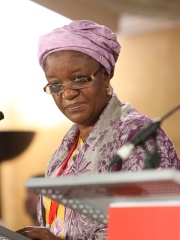
10. Zainab Bangura (b. 1959)
With an HPI of 45.69, Zainab Bangura is the 10th most famous Sierra Leonean Politician. Her biography has been translated into 21 different languages.
Haja Zainab Hawa Bangura (; born 18 December 1959) is a Sierra Leonean politician and social activist who has been serving as the Director-General of the United Nations Office at Nairobi (UNON) since 2018, appointed by United Nations Secretary-General António Guterres. She served as the second United Nations Special Representative on Sexual Violence in Conflict with the rank of Under-Secretary-General of the United Nations from 2012 to 2017, in succession to the first holder of the post, Margot Wallström. In 2017 she was succeeded by Pramila Patten. In 2007, Bangura became Sierra Leone's foreign minister in the government of President Ernest Bai Koroma of the All People's Congress (APC) Party. She was the second woman to serve in that post, following Shirley Gbujama who held that position from 1996 to 1997. She served as Minister of Health and Sanitation from 2010 to 2012.
People
Pantheon has 10 people classified as Sierra Leonean politicians born between 1895 and 1967. Of these 10, 4 (40.00%) of them are still alive today. The most famous living Sierra Leonean politicians include Nabih Berri, Ernest Bai Koroma, and Valentine Strasser. The most famous deceased Sierra Leonean politicians include Ahmad Tejan Kabbah, Foday Sankoh, and Siaka Stevens.
Living Sierra Leonean Politicians
Go to all RankingsNabih Berri
1938 - Present
HPI: 66.11
Ernest Bai Koroma
1953 - Present
HPI: 57.46
Valentine Strasser
1967 - Present
HPI: 46.23
Zainab Bangura
1959 - Present
HPI: 45.69
Deceased Sierra Leonean Politicians
Go to all RankingsAhmad Tejan Kabbah
1932 - 2014
HPI: 62.96
Foday Sankoh
1937 - 2003
HPI: 61.65
Siaka Stevens
1905 - 1988
HPI: 58.54
Joseph Saidu Momoh
1937 - 2003
HPI: 54.32
Milton Margai
1895 - 1964
HPI: 52.65
Johnny Paul Koroma
1960 - 2003
HPI: 48.04
Overlapping Lives
Which Politicians were alive at the same time? This visualization shows the lifespans of the 6 most globally memorable Politicians since 1700.

